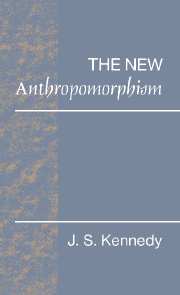Chapter 5
Published online by Cambridge University Press: 29 January 2010
Summary
Chapter 3 included two generally recognized errors (see 3.4 and 3.5) that did not spring from teleology but from another form of anthropomorphism, namely ascribing our cerebral abilities to animals. This chapter presents three other cases where it is unjustifiably assumed that the animals share these abilities, and one case of assuming that they share our feelings.
Intentionality
We have intentions, and we tend to assume that animals have them too, which we cannot know. To the layman ‘intentionality’ sounds like nothing more than a learned synonym for purposiveness (4.2), but it has come in for a good deal of discussion recently especially among philosophers and psychologists. For instance, Asquith queried the intentions imputed to higher primates by workers who describe these animals as giving each other “warning” signals: “‘Warning’ conspecifics about a possible predator may be recognized (defined) by the function that the behaviour fulfils regardless of how it was manifested (for instance, by shaking branches, calling, running or freezing). However… the animal's intention to perform the function… is not scientifically testable” (Asquith 1984, pp. 142–3). Intentionality is indeed scientifically untestable in animals, but among people warnings are, by definition, intentional. Hence describing an animal's actions (shaking branches, etc.) as a warning to its fellows effectively takes it for granted that those actions were intentional on the part of the animal.
- Type
- Chapter
- Information
- The New Anthropomorphism , pp. 85 - 123Publisher: Cambridge University PressPrint publication year: 1992



